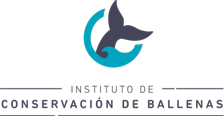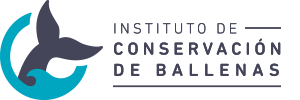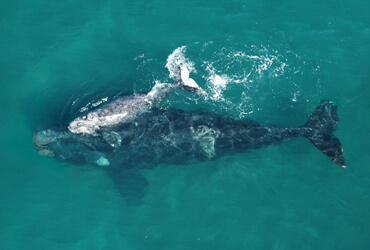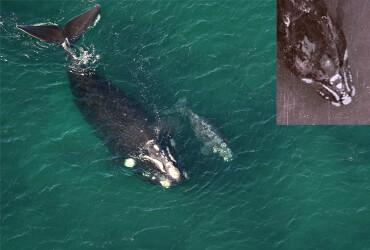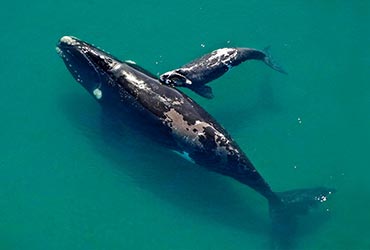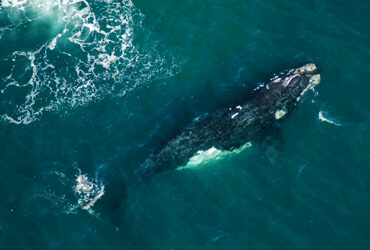
Adopt now and join us to protect whales!
By adopting a whale, you contribute funds that support scientific studies to learn about their population dynamics and health, identify threats and develop solutions to the challenges they face in the ocean.
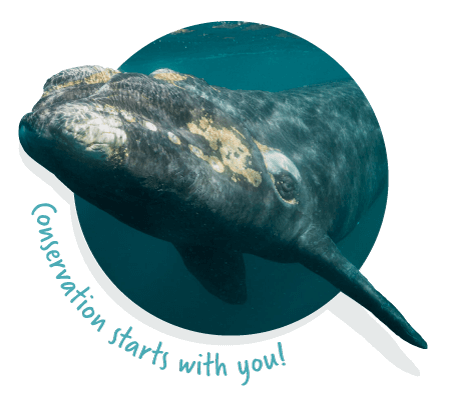
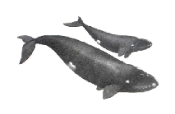
How can I help?
By adopting a whale you will be contributing to protect them in their home, the ocean. Mochita, Pionera, Docksider and Hueso are among the more than 4500 right whales photo-identified in Peninsula Valdes since 1971. Each one has its own life history, allowing you to get to know them and understand the importance of protecting them.
Meet the whales to adopt:
MOCHITA
We have known Mochita since her birth in 1999. Her name comes from the fact that she is missing the right tip of her fluke. Although it is unclear what happened to her, it is possible that she was attacked by orcas or collided with a propeller. Despite this injury, she survived and had her first calf, the beautiful «Medialuna», when she was seven years old. Mochita has become a symbol of right whale conservation and is a great protagonist of the talks given by Dr. Mariano Sironi on «whale-nality».
PIONERA
Pionera is one of the most special whales in our research program. Her catalog number indicates that she is the daughter of whale 0110 and that she was born in 1971, the year in which Dr. Roger Payne conducted the first aerial photo-identification survey of the right whales of Península Valdés. This scientific event that took place in Argentina has marked a milestone in the history of whale research worldwide.
DOCKSIDER
We know of five generations of whales in Docksider’s family. We knew she was a female when in 1994 she had her first calf, at seven years of age.
Most female right whales have their first calf at nine years of age, although some are earlier mothers. Although Docksider was a bit young to be a mother, she gave birth to a beautiful calf. The big surprise was that the calf was almost white.
HUESO
We have known Hueso since 1999, the year of her birth. All her records were made by Dr. Mariano Sironi, Scientific Director of the ICB, during his studies. He named her Hueso because of the small bone mark along her back. Hueso provided key information to understand the behavior and social development of juvenile right whales. In his life story, Mariano tells in first person each of his encounters with this whale so special to him.
About the Program
The Southern Right Whale Adoption Program allows you to support the protection of whales from anywhere around the globe. By adopting a whale, you can contribute funds to support ongoing scientific studies. These studies help us learn about whale population dynamics and health, as well as detect threats and find solutions to the problems they face in the ocean. From a monthly donation you can become part of the community of «whale adopters». This program is supported by over 50 years of continuous scientific studies of the right whale population in Patagonia Argentina.
Gift pack, adoption certificate, regular update and more…
• Certificate of adoption including your name and the whale photography.
• Your whale’s bio with all the observation records and our history with them.
• A paper whale to assemble as part of the Argentinian Sea Collection created in collab with Guardabosques.
• Subscription to the newsletter «Noticias Francas».
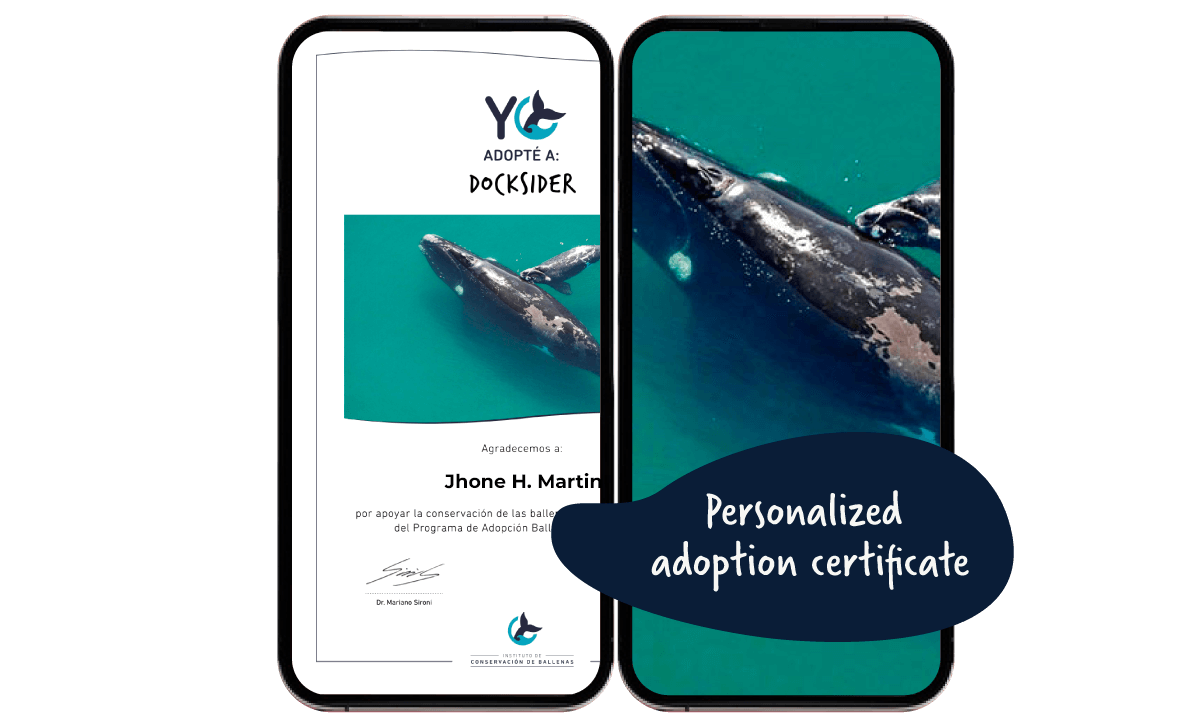
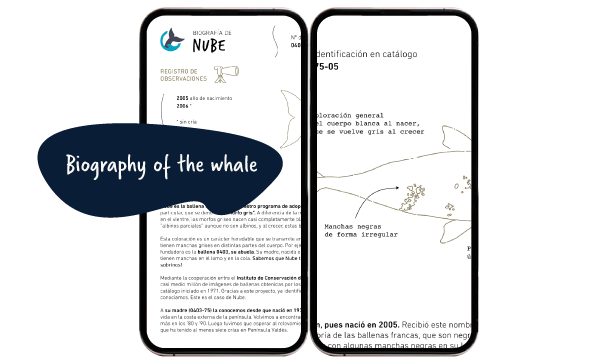
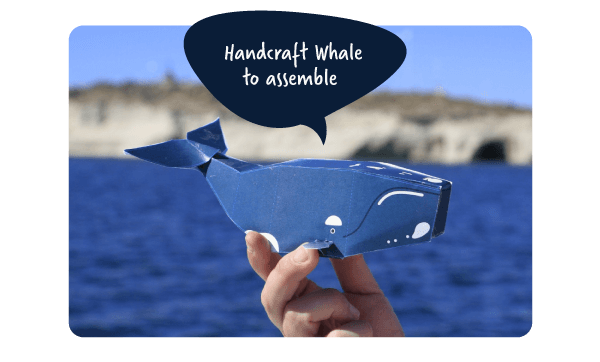
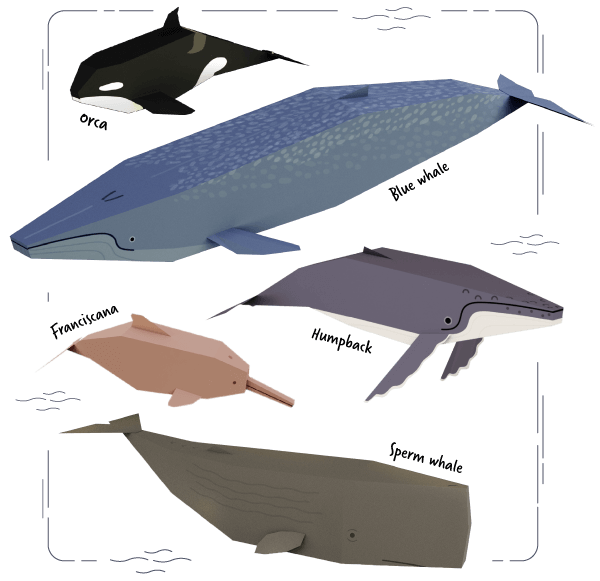
Starting in the second year, you will be able to build the «Cetaceans of the Argentine Sea» Collection.
More than 30 species of cetaceans live in the Argentine Sea, including various mysticetes (whales) and odontocetes (dolphins, porpoises, sperm whales and beaked whales). Their characteristics, size and shape are very variable, however, beyond their differences, they share the same sea where the southern right whale lives.
Be part of the community of
«whale adopters».
The program is supported by over 50 years of continuous scientific studies of the right whale population in Patagonia, Argentina.

Starting in the second year, you will be able to build the «Cetaceans of the Argentine Sea» Collection.
More than 30 species of cetaceans live in the Argentine Sea, including various mysticetes (whales) and odontocetes (dolphins, porpoises, sperm whales and beaked whales). Their characteristics, size and shape are very variable, however, beyond their differences, they share the same sea where the southern right whale lives.
Be part of the community of «whale adopters».
The program is supported by over 50 years of continuous scientific studies of the right whale population in Patagonia, Argentina.
About us
The Instituto de Conservación de Ballenas (Whale Conservation Institute) is an Argentine non-profit organization dedicated to the conservation of whales and their habitat through research and education. It was founded in Buenos Aires in 1996 when it began cooperating with Ocean Alliance to carry out and strengthen the «Southern Right Whale Research Program» in Argentina. Its main objective is to monitor the status of the southern right whale population at Península Valdés, to learn about their biology, habitat needs, the threats they face, and to provide data for their management and protection.
